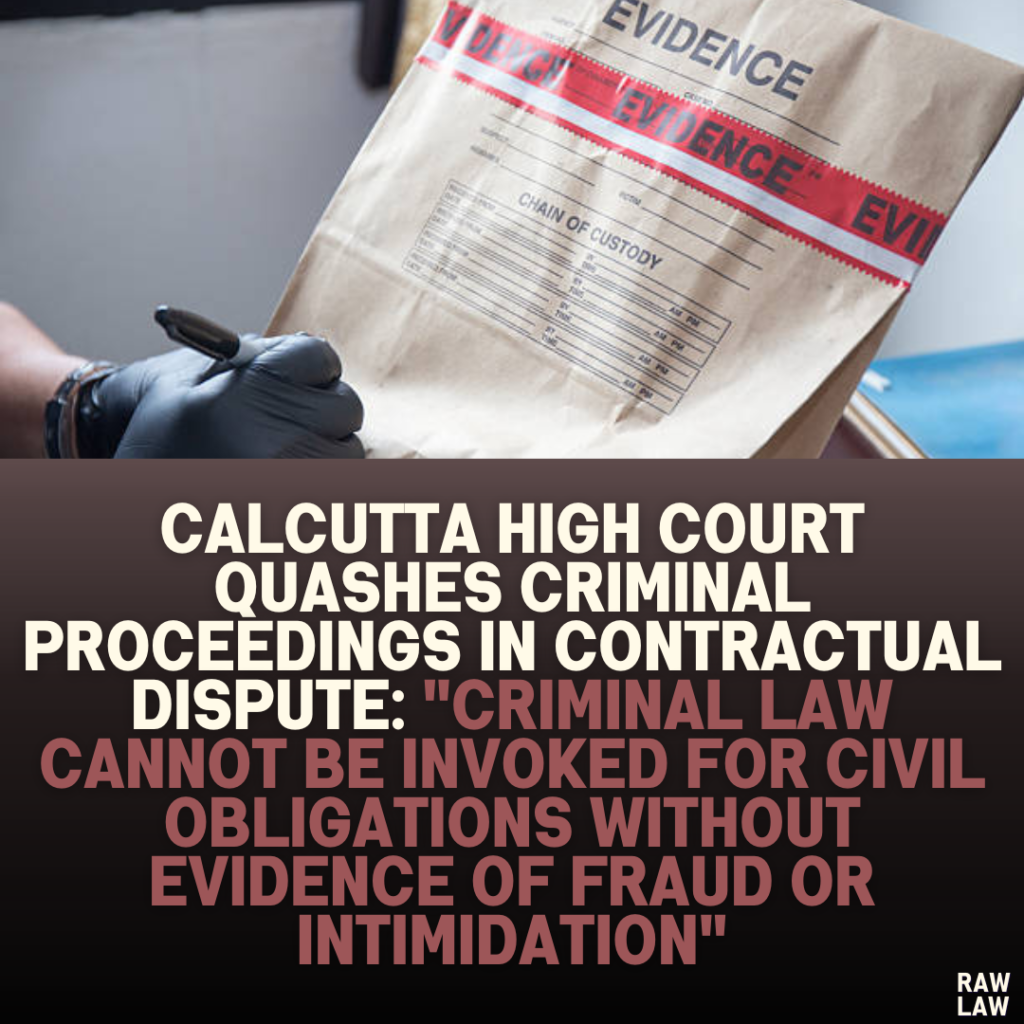Court’s Decision:
The High Court of Calcutta quashed the criminal proceedings against the petitioners under Sections 420, 506, and 34 of the Indian Penal Code (IPC), citing the matter as a civil dispute rather than a criminal offense. The court exercised its inherent powers under Section 482 of the Code of Criminal Procedure (CrPC) to prevent the misuse of judicial machinery.
Facts:
- The complainant had entered into an agreement with the petitioners for land conversion services in two areas. The total fee agreed upon was ₹80 lakhs.
- The complainant alleged that:
- He completed the conversion work in June 2017.
- He received ₹15 lakhs upfront but was still owed ₹65 lakhs.
- The petitioners sold the converted land for ₹55 lakhs without paying the due amount.
- Repeated attempts by the complainant to recover the amount were unsuccessful. He alleged threats and harassment when he approached the petitioners for payment, leading him to file a complaint with the police.
- Based on the complaint, a case was initiated under Sections 420 (cheating), 506 (criminal intimidation), and 34 (common intention) IPC.
Issues:
- Did the allegations in the complaint establish a criminal offense under Sections 420 and 506 IPC, or was the dispute civil in nature?
- Was the case a fit instance for quashing under Section 482 CrPC?
Petitioner’s Arguments:
- Nature of the Dispute:
The petitioners contended that the issue arose from a contractual obligation, which is a civil matter. No criminal offense had occurred. - Absence of Fraudulent Intent:
They argued that there was no dishonest or fraudulent intention at the time of entering into the agreement, which is a prerequisite for establishing cheating under Section 420 IPC. - Baseless Allegations of Intimidation:
The claims of criminal intimidation under Section 506 IPC were vague and unsupported by specific details or evidence. - Preventing Abuse of Process:
The petitioners sought quashing of proceedings, arguing that allowing such a case to proceed would lead to misuse of judicial resources and unnecessary harassment.
Respondent’s Arguments:
- Default on Payment:
The complainant argued that despite completing the agreed work and incurring costs, the petitioners failed to pay the balance amount, which constituted cheating. - Threats and Harassment:
The complainant alleged that when he demanded payment, the petitioners threatened him with harm, amounting to criminal intimidation under Section 506 IPC. - Need for Trial:
The respondent submitted that the case involved elements of fraud and intimidation, which required a thorough trial to ascertain the truth.
Analysis of the Law:
- Cheating Requires Fraudulent Intent at Inception:
- The court reiterated that for an offense of cheating under Section 420 IPC, there must be evidence of fraudulent or dishonest intent at the time of making the promise or entering the contract.
- Reference: V.Y. Jose v. State of Gujarat (2009) emphasized that mere failure to meet contractual obligations does not amount to criminality.
- Civil Nature of the Dispute:
- The court highlighted that disputes over non-payment for services rendered typically fall under civil law. Criminal law cannot be invoked unless clear elements of fraud or criminal intention are evident.
- Reference: Paramjeet Batra v. State of Uttarakhand (2013) held that cases involving civil disputes disguised as criminal offenses can be quashed under Section 482 CrPC.
- Guidelines from Bhajan Lal’s Case:
The court applied the principles laid down in State of Haryana v. Bhajan Lal (1992), which provides illustrative categories for quashing criminal proceedings, including:- Cases where allegations do not disclose a criminal offense.
- Cases where proceedings are maliciously instituted with ulterior motives.
This case fell under these categories as the allegations were rooted in contractual non-performance rather than criminal conduct.
- No Evidence of Criminal Intimidation:
The allegations under Section 506 IPC lacked specific details about the threats, their timing, or circumstances, making them insufficient to justify prosecution.
Precedent Analysis:
The court relied on various judgments to support its reasoning:
- Sarabjit Kaur v. State of Punjab (2023): Breach of contract does not automatically imply cheating.
- Vesa Holdings (P) Ltd. v. State of Kerala (2015): Establishing the distinction between contractual disputes and criminal offenses.
- Bhajan Lal’s Case (1992): Providing grounds for quashing proceedings where they are baseless or malicious.
Court’s Reasoning:
The court concluded:
- Lack of Criminal Elements:
The dispute arose from an alleged failure to pay for services rendered, which is a civil matter. The ingredients of cheating, such as fraudulent intent at the time of entering the agreement, were absent. - Abuse of Judicial Process:
Initiating criminal proceedings for a civil dispute was deemed an abuse of legal processes. The court stressed the importance of using Section 482 CrPC to curb such practices. - Inadequate Evidence of Intimidation:
The allegations of threats and harassment lacked specificity and were likely included to exert pressure on the petitioners for recovery of money.
Conclusion:
The High Court quashed the criminal proceedings, including the cognizance order dated September 2, 2019. It emphasized that the complainant could pursue remedies through civil litigation but not through criminal prosecution.
Implications:
- Reaffirmation of Civil-Criminal Distinction:
The judgment reinforces the principle that criminal law cannot be used as a substitute for civil remedies, ensuring that criminal proceedings are not misused for private disputes. - Deterrence Against Abuse of Process:
The decision underscores the High Court’s role in safeguarding individuals from unwarranted harassment through malicious prosecutions. - Guidance for Future Cases:
By applying established precedents, the judgment serves as a reference for resolving similar disputes, emphasizing the need for courts to carefully examine allegations before allowing criminal cases to proceed.




Pingback: Delhi High Court Directs Bank to Reconsider Forfeiture of Auction Deposit, Highlights Equitable Considerations in Light of Subsequent One-Time Settlement and Absence of Financial Loss - Raw Law